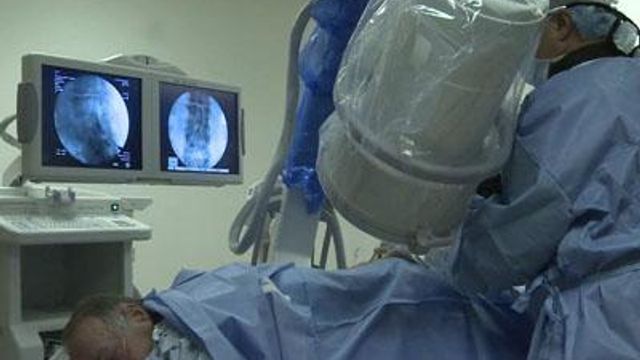Procedure offers relief for back pain in some
Spinal stenosis, or a narrowing of the spinal canal, is a common cause of pain that can make walking difficult. A new procedure gives some patients with back pain another option to avoid major surgery.
Posted — UpdatedAnita Abatemarco, 79, developed the condition last summer while staying with her husband in the hospital before he passed away. Helping him in and out of bed left her with terrible back pain that even spinal steroid injections didn't help.
“This is a very common cause of pain and disability in mainly elderly patients, but we can see it in younger patients," said Dr. Paul Kuzma, a neck and back pain specialist at First Health Moore Regional.
Kuzma said spinal stenosis can be caused by a disc bulging into the spinal canal or by arthritis with calcium deposits pressing into the same area. The thickening of ligaments can also push into the spinal canal.
When conservative treatments fail, major back surgery can relieve the pain, but it might be too risky for many elderly patients.
A new procedure called MILD, or Minimally Invasive Lumbar Decompression, can remove the thickened ligaments and relieve the pressure on the spinal nerves.
"The beauty of the operation is that we are able to do it through a needle which is slightly smaller than a pencil," Kuzma said.
Guided by fluoroscopic imaging, miniature instruments cut away the problem ligaments and small pieces of bone they're attached to.
"At the end of the procedure, we take the needles out, put a Band-Aid on the patient's back, and they go home the same day," Kuzma said.
Abatemarco underwent the procedure.
"I got up in the morning, and I didn't have to hold on to any furniture. It was wonderful, and to this day, I have no pain," she said.
MILD only addresses spinal stenosis caused by thickened ligaments, not by those caused by arthritis or bulging discs.
• Credits
Copyright 2024 by Capitol Broadcasting Company. All rights reserved. This material may not be published, broadcast, rewritten or redistributed.





